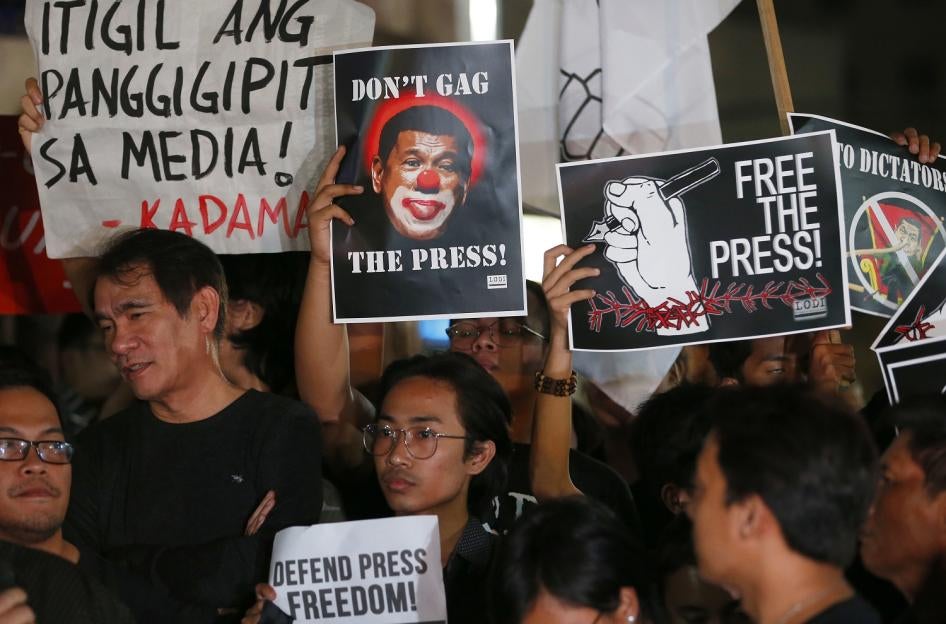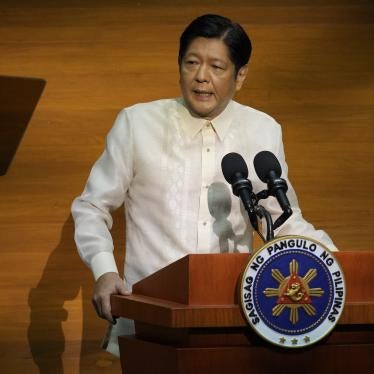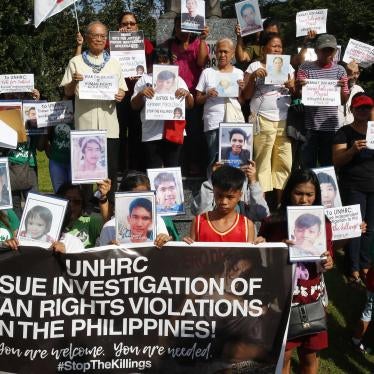(Manila) – The Philippine Congress should reject President Rodrigo Duterte’s apparent misuse of regulatory powers against the country’s largest broadcast network, Human Rights Watch said today. On February 10, 2020, the Office of the Solicitor General filed a petition before the Supreme Court seeking to nullify the franchise of ABS-CBN, which has long faced Duterte’s ire for criticizing his “war on drugs” and other policies.
Congress is authorized to renew the licenses of broadcasting companies, but the House of Representatives has yet to act on nearly a dozen renewal bills already filed. The administration’s legal action could prevent Congress from extending the 25-year-old network’s permit, which expires on March 30.
“Philippine legislators have a responsibility to uphold media freedom and resist administration efforts to pressure news outlets to toe the government’s line,” said Carlos Conde, Philippines researcher. “President Duterte’s administration should cease its politically motivated legal actions against the network.”
Duterte has publicly attacked ABS-CBN, accusing it of “swindling” him by not airing his advertisements during the 2016 presidential campaign, a charge the network has denied. He has also urged the media company to “just sell” its assets, vowing that he would make sure its franchise would not be renewed. Duterte and his allies have accused the network of being sympathetic to the political opposition. Its owners, the Lopez family, are longtime political opponents of the former Ferdinand Marcos dictatorship. Administration officials have also complained about the network’s critical coverage of the “drug war.”
The suit filed by Solicitor General Jose Calida, the government’s chief lawyer, called a quo warranto petition, seeks to nullify ABS-CBN’s original franchise, contending that the network has engaged in “abusive practices” that violate its franchise. Calida also alleged that ABS-CBN allowed foreigners to invest in the company, in violation of Philippine Constitution.
ABS-CBN said in a statement that it “complies with all pertinent laws governing its franchise and has secured all necessary government and regulatory approvals for its business operations.” It called the petition an attempt to shut down its operations.
The Philippines’ license renewal process allows congress to put inappropriate pressure on broadcast networks. The United Nations Human Rights Committee, the independent expert body that monitors government compliance with the International Covenant on Civil and Political Rights (ICCPR), to which the Philippines is a party, has stated that governments “must avoid imposing onerous licensing conditions … on the broadcast media. The criteria for the application of such conditions and license fees should be reasonable and objective, clear, transparent, nondiscriminatory and otherwise in compliance with the Covenant.”
The Duterte administration’s apparent efforts to intimidate and control ABS-CBN mimic its actions against the news website Rappler. Rappler and its editor, Maria Ressa, are facing numerous court cases as a result of their critical coverage of the “drug war.” Rappler and ABS-CBN have documented many of the thousands of killings by the police and their agents in Duterte’s anti-drug campaign. The Philippine Daily Inquirer has also faced attacks from Duterte because of its “drug war” reporting and commentary.
“The administration’s attempt to cancel ABS-CBN’s franchise or deny its extension is not just an attack on a single network, but an all-out assault on media freedom,” Conde said. “Complaints against broadcasters should be addressed in the proper forum, such as the National Telecommunications Commission.”








